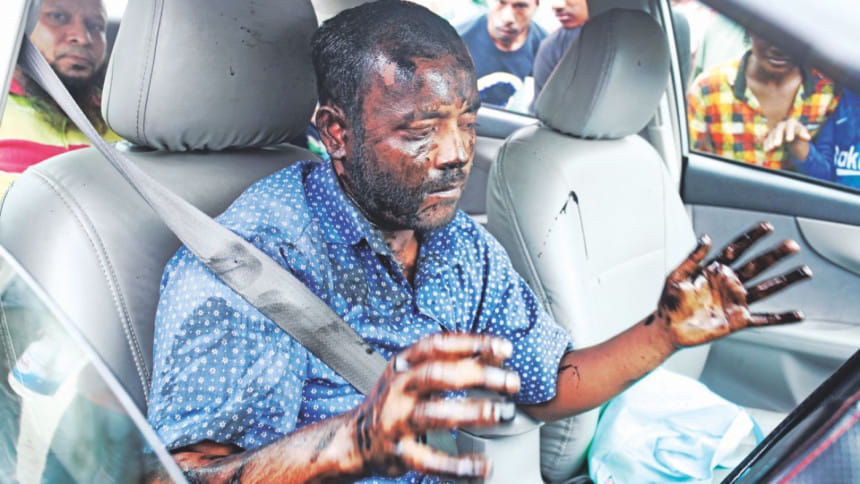Strike piles on misery

Road transport workers virtually held people hostage for a second straight day yesterday as their 48-hour work stoppage caused untold public suffering, especially to commuters and schoolgoers.
There was no visible step, including for talks with the worker leaders, from the government to end the strike that also hurt businesses. Yesterday's cabinet meeting also did not have any formal discussion on the issue.
Against the backdrop of the situation, Bangladesh Road Transport Workers Federation, led by Shipping Minister Shajahan Khan, threatened to enforce a 96-hour strike in the third week of next month.
Federation's General Secretary Osman Ali told The Daily Star that they would go for the strike as the government did not communicate the platform over its eight-point demand, including amendments to the recently passed Road Transport Act-2018.
Like on Sunday, the capital yesterday virtually remained cut off from rest of the country as no long-route bus was operated to and from Dhaka. Beside, no public transport, except some BRTC buses, was available on the city streets.
Many commuters and students were forced to walk to their destinations. Many were seen travelling on rickshaw vans paying high fares.
The pickets also continued to obstruct cars, CNG-run three-wheelers and motorcycles at different places in the capital. They also smeared used engine oil on the faces of some drivers in Postogola, Kajla, Dhalpur, Shanir Akhra, and in some parts of old Dhaka, an act that triggered huge criticism on social media.
Chattogram port had been facing a stalemate in its overall activities like loading, offloading and delivery of goods since Sunday morning due to the countrywide transport strike. A similar situation prevailed at country's largest land port in Benapole. Port officials said the government suffered a loss of around Tk 36 crore in revenue in the last two days.
Leaders of the workers' federation had announced the strike at a rally in front of the Jatiya Press Club on Saturday. The work abstention began at 6:00am the next day.
Their demands include making all offences under the Road Transport Act bailable, scrapping the provision for the fine of Tk 5 lakh on a worker for involvement in a road accident, changing the minimum educational qualification required to obtain driving licences from class-VIII to class-V, and ending harassment by police on roads.
Meanwhile, Tajul Islam, president of Bangladesh Inter-district Truck Drivers Union, said they started plying trucks yesterday evening.
SUFFERING ALL AROUND
Cancer patient Angura Begum took chemotherapy at a private hospital in the capital on Sunday. Around noon yesterday, she, her husband and their son went to Mohakhali Bus Terminal to go to their home in Bogura.
“We knew about the strike but thought bus operation would start in the evening. But people at the counters said it won't. We don't know what we will do now,” Angura's son Ali Hossain told this correspondent at the terminal around 2:30pm.
Sumon Alam, a man who was also waiting at the terminal to catch a bus, said, “The government should not allow such strikes as they cause immense public suffering across the country.”
Rabiul Islam, a man from Satkhira, came to Dhaka on Saturday. As no buses plied on the route on Sunday, he could not go back and stayed at a hospital that night.
“I stayed there as I knew one of the doctors. It's not possible now to go there again,” said the man, adding he could not afford to stay in a hotel.
“What can I do now? If no bus leaves Dhaka, I have to sleep at this terminal,” he told The Daily Star at the Gabtoli terminal.
Visiting the city's Gabtoli, Mohakhali and Sayedabad areas yesterday, this newspaper found long route and inter-city buses were parked at the terminals and nearby roads. Many were seen waiting there with their luggage. The crowd got bigger in the afternoon.
Failing to get any bus, many hired microbuses and cars with exorbitant fares. Many ride-sharing motorcyclists cashed in on the situation, charging passengers extra.
THE NEW STRIKE
Osman Ali said their federation would go for the 96-hour work abstention next month to press home their demands, as the government did not communicate them.
“None from the government talked to us about our demands. So, our central committee has decided to go for the strike,” he said.
“Date of the work abstention has not been fixed yet. It may start from third week of November,” he said, adding they wanted to give the government another 21 days for meeting the demands.
Asked about the public sufferings, he blamed it all on the government. "We informed the government about our demands one month ago, but it went unheeded. So, the government is responsible for it."
Another top leader of the federation said it seemed the government had taken a strong position against the strike and the demands.
“So, we could do nothing but taking a tougher stance [on the matter] to press home our demands. We have been facing a huge pressure from workers for waging a tougher movement to bring changes to the law,” he said, wishing not to be named.
On Sunday, Road Transport and Bridges Minister Obaidul Quader said there was no scope to amend the act now in the current parliament.
It was expected that the issue would be discussed in the weekly cabinet meeting yesterday but Cabinet Secretary Mohammad Shafiul Alam said no “formal” discussion on it was held.
Shipping Minister Shajahan Khan, who drew huge criticism over the strike, did not take part in the meeting as one of his relatives died. Obaidul Quader spoke at a press conference at the Awami League president's Dhanmondi office but did not utter a single word on the strike.

 For all latest news, follow The Daily Star's Google News channel.
For all latest news, follow The Daily Star's Google News channel. 








Comments